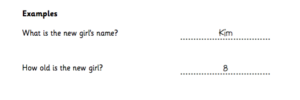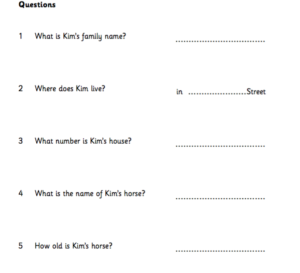About Pre-A1 Starters Listening Part 2 – and How to do well!
In this Part of the Starters Listening Test, learners listen to a conversation between a girl and a boy, or a child and an adult. It will always be clear who’s speaking, as the voices are easy to distinguish.
In this example here, taken from 2018 Sample Papers Volume 1, we can see from the picture that the conversation is between a girl and a man. They are in a classroom, so this gives us the context.
The conversation focuses on personal information. Students have to write a name or a number.
The task starts with two examples – one for a name and the other for a number. This gives students a chance to become familiar with the voices.
Students then have to answer five questions, writing a name or a number.
Tips:
1 Questions about names are usually obvious because they contain the word ‘name’! But sometimes, this might not be so obvious from the question, e.g. Where does Kim live? Which beach does Pat like?
2 First names come from the Starters wordlist. Make sure your students are familiar with the pronunciation of these names. Practise spelling them out to students.
There are 21 first names on the Starters wordlist: Alex; Alice; Ann; Anna; Ben; Bill; Dan; Eva; Grace; Hugo; Jill; Kim; Lucy; Mark; Matt; May; Nick; Pat; Sam; Sue; Tom
Being familiar with them will help them do well in this part of the Listening Test (and Part 1 too!)
3 Other names will be parts of surnames, street or school names, etc. In this Sample task, we can see that questions 1 and 2 and 4 require students to write names. Question 1 is a family name, and in 2, they have to complete the name of the street. Question 4 is the name of Kim’s horse.
4 When learners have to write a surname, then the words Mr/Mrs or Miss will be written on the question paper before the line. Make sure learners are familiar with the pronunciation of Miss, Mrs and Mr as this will help them understand the name when they hear it.
4 These names will come from the Starters wordlist. They will be spelled out.
In this case, they have to write Wall, Sun and Tiger. As you can see, a range of letters are tested.
And some of the letters, like ‘w’, ‘g’, ‘r’ are often misspelt by students. ‘Pairs’ of letters like t/d, p/b, v/b, q/w, i/y need practise.
Tip: Give your students lots and lots of practice spelling out words or writing them down as you spell them out.
Make this fun by asking them to listen and write letters, e.g. S-U and then say ‘Stop!’ and say the remaining letters and say the word. (Stop! ‘n’ sun!) You can give them points for completing the word, or points for each remaining letter they say. Children love this game! They can also draw pictures for the words if they like.
For the numbers, questions will usually begin with: How many or What number but might also ask things like: Which class is Kim in?
At Starters, only the numbers 1-20 will be tested, as bigger numbers are not on the wordlists till Movers.
Give students lots of practice understanding and writing numbers.
And one very important tip! Tell students to write numbers as numbers (1,3,8), not words (one, three, eight). Then they won’t lose marks for spelling mistakes and it’s quicker too!
In Starters Listening Part 2, students will both read and hear the questions they have to answer.
And they will hear the words and numbers they have to write twice.
But they will only hear the spelling of the names once.
But tell them not to panic if they miss the spelling or any of the numbers the first time they listen – as with all parts of the Listening Test, they will hear the recording twice.
The only difference the second time they hear it is that the pauses between the questions are shorter.
They get 10 seconds to write their answers the first time, and 5 seconds the second time they listen.
And at Starters, there is no distraction! No other words that could be the answer. This comes in in Part 2 at Movers and Flyers, but we’ll talk about that in future posts for those levels!





